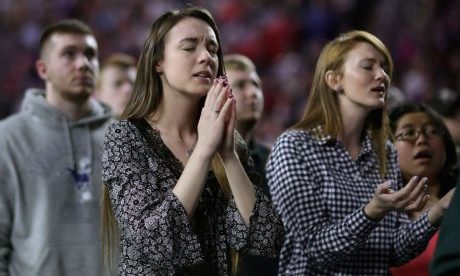Every few years, it seems, conservative religious groups, quiescent or unnoticed, come blazing back onto the national scene, and the secular press reacts like the bad guy in the 1971 western Big Jake who says to John Wayne, “I thought you were dead.” Wayne drily answers, “Not hardly.”
Now, in The Evangelicals: The Struggle to Shape America, Frances FitzGerald answers the recurrent question, “Where did these people [mainly right-wing zealots] come from?”
She says there is no mystery involved. They were always here. We were just not looking at them. What repeatedly makes us look again is what she is here to tell us.
“Evangelicals” is an elastic term, and FitzGerald intermittently shrinks or stretches it. But she does direct us to the right starting point, to the eighteenth- and nineteenth-century Great Awakenings, major religious events in our early history when the word “evangelicalism” came into wide American use.
Evangelical religion is revival religion, that of emotional contagion. It can best be characterized, for taxonomic purposes, by three things: crowds, drama, and cycles.
Crowds
The first Great Awakening, of the 1730s and 1740s, stunned entire regions by the numbers of people who took part.
The leading preacher in a cadre of them, George Whitefield—who, with John and Charles Wesley, founded the Methodist movement in England—had followings that overflowed the churches and followed him out to streets, plazas, or the nearby countryside.
When Benjamin Franklin went to hear Whitefield preach from the steps of Philadelphia’s City Hall in 1739, he measured with characteristic precision the reach of his voice in different directions, and felt that he had verified reports that 25,000 people could hear him preach in a cleared space.
Before he came from England, Whitefield had already become a “field preacher”; the skeptic David Hume, who listened to one of his sermons in Edinburgh, is said to have told a friend, “He is…the most ingenious preacher I ever heard. It is worth while to go twenty miles to hear him.”
Any man who could astonish Hume in Scotland and Franklin in America was a preacher beyond any orbit of expectation. The great Samuel Johnson said of Whitefield, “He would be followed by crowds were he to wear a night-cap in the pulpit, or were he to preach from a tree.” Continue reading
Sources
- The New York Review of Books, review by Garry Wills
- Image: Theology & the City
